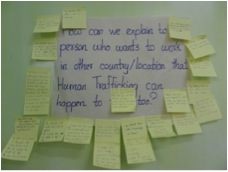When Caroline Seow suggested a human trafficking prevention workshop as a training course for Convent of Holy Infant Jesus (C.H.I.J) teachers in rural Myanmar, we saw a great fit with Clinked’s education program. C.H.I.J was founded in 1662 to educate the poor in France by recruiting educated women to be teachers. In Asia, Sister’s from France opened schools for girls in Malaysia, Singapore and Japan (Futaba) in mid 1800s. In 2007 C.H.I.J started teacher training institute called Pyinya Sanyae (stream of wisdom) Institute of Education (PSIE) to train teachers serving vulnerable children in 12 locations in Myanmar. Sr. Grace, heading PSIE, felt an increasing need to incorporate human trafficking workshop for their teachers, as young people in rural communities, see migration as the only way out of poverty.
Clinked immediately knew that for these young teachers it would be a challenge, as many of the high risk youth and families do not want to acknowledge the danger when it comes to migration. So the workshop needed to cover not only knowledge on human trafficking, child protection and prevention but provide a sense of empowerment for the teachers. CLinked did this by incorporating leadership and organizing skills based on professor Marshall Ganz ‘s public narrative and community organizing.
The program was designed to be experiential with many group sessions with facilitators, numerous briefing/debriefing sessions and performance/roll playing throughout. The 21 teachers acted out many skits using improvisations and forum theater. Caroline made sure we had three excellent volunteer facilitators in addition to herself. Sr. Rosemary from Ireland, an expert in child protection, Jo Jo from Myanmar, a graduate of PSIE and an excellent teacher coordinator and Cornell graduate Lynn from Singapore, a management consultant.
Lyn and I met up for the first time on the Jeststar flight from Singapore to Yangoon on Sunday. When we arrived in Yangoon I was looking around for Caroline, who arrived on an earlier flight. I found out that courageous Lyn volunteered through referrals and had never met Caroline or any of us before. We finally found Caroline and Jacinta, who is in charge of the institute during Sr. Grace’s trip.
We started the workshop review that afternoon at Jacinta’s home, located on a colorful street full of little stores and street vendors selling bananas and deep fried snacks and local delicacies. Myanmar is a country of 60 million people, 135 ethnic groups and 105 local languages. Myanmar is also very diverse. We saw people with many shades of skin color and facial features sporting western, local and Islamic fashion in the street.
Sharing our personal stories with the newly met facilitators during the public narrative coaching brought us closer. By the time we were sipping cold Burmese beer and sharing Burmese fried rice for dinner prepared by the teacher trainees.
March 17 Monday 2014
Our accommodation was at Humble Footprints, a brand new comfortable hostel https://www.facebook.com/humblefootprints, just minutes away from Jacinta’s apartment and not too far away from the Shwedagon Pagoda.
(This is internet image, I did not have the time to visit the Pagoda and forgot to take the photo of the hostel)
After our coffee and meat pie (quite yummy) breakfast, Jo Jo came to pick us up at 9AM. Jo Jo was an amazing resource, as she was able to both facilitate, gage teachers learning level and translate difficult concepts during the workshop. (photo of Caroline, Jo Jo, Lyn in front of PSIE)
(Street market near where we stayed)
Caroline, Lyn and I were welcome by Jacinta and 21 teachers from various parts of Myanmar. The classroom was spacious with projector system and audio. I was so glad that my neighbor lent me a VGA connector for projecting my presentation the night before leaving Singapore because I found out MAC VGA was ALL sold out in Myanmar.
(Jacinta introducing us)
Teachers came from various parts of rural Myanmar where regions are divided based on ethnic groups. In our workshop we had teachers from Kachin, Shan and southern states boarding Thailand, where trafficking is rampant. Most of the teachers see human trafficking as a big problem in their community because of poverty and migration but felt they did not have enough knowledge to teach the children or provide prevention ideas.
Theater: A women sold into a bar has to serve clients without pay under the watchful eyes of the owner
Tuesday 18 March 2014
We started the day by reviewing yesterday’s learning. Before taking our workshop, teachers thought “Poverty” was the only reason for human trafficking. Now they have learned that geo-politics, economic growth, family, gender inequality and consumer demand all play a complex role. They also enjoyed the end of the day session on leadership. In the community organizing module they learned that leadership is about asking the right questions and using coaching skills rather than providing all of the answers. One of the teacher, Josephine (photo: in front middle row) asked a question:
“How can we explain to people who want to work in another country, that human trafficking can happen to you too?’. This was such an important question, that we asked people to write their answers on post-it's during the workshop.
We got so much response to Josephine’s question
Telling STORY of SELF in public narrative session
Today’s focus was on deepening community organizing skills by learning how to develop your own public narrative on why each participant felt they where called to be a teacher, followed by learning how to build relationships and shared commitments. The class got divided in a group of 6 with each facilitator sharing their own 2 minutes of “story of self”. The story has to convey our values, challenges and choices made in life. Each participants shared their 2 minute story about why they chose to be teachers for children from disadvantaged community.
Debrief of the relationship building module by each group
On relationship building module participants learned how to find common interests and develop shared commitment by exchanging each others resources. In Myanmar culture doing a one-on-one meeting for relationship building purpose is something new. After experiencing in the group work session, everyone saw the benefit.
Wednesday March 19 2014
The focus of the last day was developing a one year human trafficking action plan, that each teacher will take back to her community to implement. We started the day with a review of the human trafficking situation in Myanmar. Officially over 300 people each year are recognized as trafficking victims but the number is just the tip of the iceberg. With huge porous border to Thailand and China, people get trafficked both internally and externally all over south east Asia. Domestic workers, fishing boats, seafood factory, forced marriage in China, street children in Malaysia, internal mining and sex workers. We learned that one of the teacher in another group is a survivor, who had been trafficked to Singapore.
By now everyone was asking “what can we do to prevent this horrible problem”. We dove into the prevention part of the module, by stressing the importance of behavioral and attitudinal change of the entire community, including families, village leaders, potential exploiters, consumers and the victims. As so many young people feel “It’s not going to happen to me”. We discussed a case in an Indonesian rural village where they were able to reduce trafficking by implementing both non-migration incentives and safe migration village policies.
After the prevention, we went into “child protection” module which emphasized the importance of “safe place” for children and developing “resilience” in children.
Participants learned how to nurture resilience and create a safe place for their students to avoid them from being prime target for unsafe migration. The session ended with a presentation on new efforts to engage PSIE communities to strengthen “child protection” in every boarding house.
In the afternoon the focus was on shared purpose, followed by each groups goal setting and finally the one year action plan for each teacher to implement. Shared purpose session facilitated by Lyn and Caroline was very successful.
As part of the goal setting exercise we build a team using names and fun chants. Some of the team names were “budding flowers," “warriors," and “Little Star."
Jojo who was very pleased with the final outcome. Creating an action plan was an “Aha” moment for everyone as they began to understand how community organizing skills are important for creating shared action for challenging problems.
The post workshop survey reflected a very different mindset towards human trafficking.
By the end of the course, teachers felt they gained knowledge and agency, to both protect themselves and their children.




















